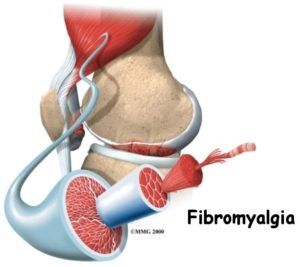
Fibromyalgia also referred to as FM or FMS, is a syndrome which is defined by discomfort and pain in muscles, ligaments and tendons in the body. The medical condition affects over six million in the United States. The pain is usually not centrally located and can be felt over the whole body. Patients, along with the pain, are tender over their whole body and discomfort can be felt when pressure is applied. To this day, the cause of fibromyalgia is still somewhat of a mystery to the medical community. There are many theories, but an exact cause has yet to be found.
Causes of Fibromyalgia
- Heredity: Like most medical conditions, fibromyalgia may be present in a person’s family history. This would heighten the risk of members of that family having minor to severe symptoms of fibromyalgia.
- Accidents, Injury or Traumatic Experience: Many times an accident, injury or traumatic experience can trigger symptoms of fibromyalgia.
- Infection: Hepatitis C, Epstein-Barr virus, parvovirus and Lyme disease all have similar symptoms and have been linked to fibromyalgia.
- Autoimmune Disorders: The body’s immune system is designed to rid a person’s body of anything that enters it which is deemed a threat to the person’s health. Over time the immune system develops a database of “threat” and “non-threat” substances to know when to attack and not attack. In most cases the immune system can differentiate between “self” and “not self”. When a person has an autoimmune disorder the body does not differentiate and will attack is own tissues. Autoimmune disorders include Rheumatoid arthritis, lupus, Scleroderma and Goodpasture’s syndrome.
Symptoms of Fibromyalgia
- Chronic Pain: Pain is the main symptom of fibromyalgia. Aching, radiating, shooting, gnawing, burning, exhausting and nagging pain are all examples of the wide range of effect with the condition. The pain may not always be consistent in location or intensity. Some people who are effected by fibromyalgia may have more intense pain in the morning and it will improve during the day only to become intense again at night. Physical activity, stress or anxiety can also cause the level of pain to heighten. Along with the pain, many people who are affected by fibromyalgia experience tender spots in the neck, shoulders, upper chest, elbows, upper buttocks, hips and knees.
- Fatigue: Ninety percent of people who suffer from fibromyalgia describe that they have moderate to severe fatigue and lack of energy. They compare it to the fatigue that is felt when one has the flu or an extreme lack of sleep. Troubled Sleeping Patterns:
Many people, due to the pain and fatigue associated with fibromyalgia, have disrupted sleep patterns. If they are able to sleep well throughout the night, they still may wake up feeling groggy and fatigued. Many times their sleep becomes lighter and they will wake up during the night. - Memory Problems: Short and long term memory can also be affected by fibromyalgia. In a study, which tested the memory capabilities of 30 women who suffered from fibromyalgia and 30 who were healthy, the results showed a dramatic fall off of short term memory in the ones who had fibromyalgia. The memory and cognative problems associated with fibromyalgia are so well documented that a term, “fibrofog”, exist for the state of not being able to remember or perform at regular levels with mental tasks.
- Multi-Tasking Problems and Diminished Attention Span: The term mentioned above, “fibrofog”, also refers to the feeling suffers get when they attempt to multi-task. Their attention span becomes shorter and they are not able perform on the same level as they were able to before the onset of fibromyalgia. Depending on the intensity “fibrofog” can make someone enable of doing simple tasks like doing the weekly shopping for grociers.
- Depression and Axienty: All of these symptoms combined can make the person who suffers feel alone and isolated. The lack of understanding from the medical community and the lack of a exact defined cure can also make the future look bare rendering the sufferer into bouts of depression. If the fibromyalgia becomes this bad the sufferer needs to seek support groups who understand what they are going through and help them through their bad days. If depression sets in, the physical aspects of the syndrome can be more overbearing as sufferers have noted that emotional distress as a factor in their more severe pains.
Treatment
- Analgesics: Acetaminophen (Tylenol) can help ease the pain and stiffness from the physical effects of fibromyalgia. Depending upon the severity and the person, the effect will vary.
- Antidepressants: If a person’s mental state has taken a turn for the worse, a doctor may prescribe antidepressants to help with the emotionally taxing time with the syndrome.
- Muscle relaxants: Muscle relaxers may be prescribed on a short term basis to help treat for extreme muscles pains and spasms.
- Pregabalin (Lyrica): Pregabalin is the first drug to be approved by the Food and Drug Administration for the treatment of fibromyalgia. Originally designed as an anti-seizure medication, it may reduce the pain and improve function in people with fibromyalgia. In a study of the drugs effectiveness, half of the participants reported improvement in their symptoms.
Feel free to contact us for assistance!




